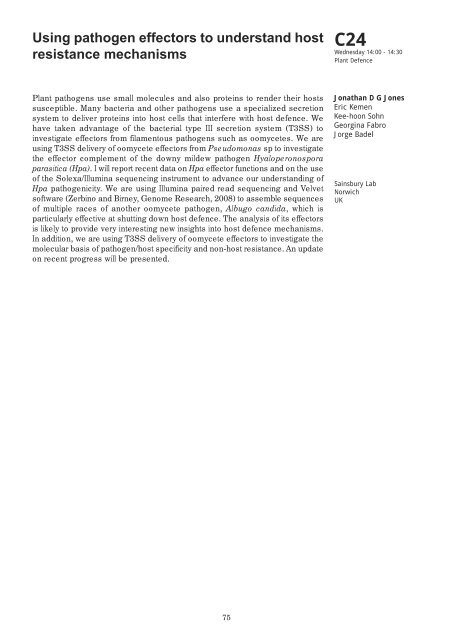Edinburgh, Scotland, United Kingdom - TAIR
Edinburgh, Scotland, United Kingdom - TAIR
Edinburgh, Scotland, United Kingdom - TAIR
You also want an ePaper? Increase the reach of your titles
YUMPU automatically turns print PDFs into web optimized ePapers that Google loves.
Using pathogen effectors to understand host<br />
resistance mechanisms<br />
Plant pathogens use small molecules and also proteins to render their hosts<br />
susceptible. Many bacteria and other pathogens use a specialized secretion<br />
system to deliver proteins into host cells that interfere with host defence. We<br />
have taken advantage of the bacterial type III secretion system (T3SS) to<br />
investigate effectors from filamentous pathogens such as oomycetes. We are<br />
using T3SS delivery of oomycete effectors from Pseudomonas sp to investigate<br />
the effector complement of the downy mildew pathogen Hyaloperonospora<br />
parasitica (Hpa). I will report recent data on Hpa effector functions and on the use<br />
of the Solexa/Illumina sequencing instrument to advance our understanding of<br />
Hpa pathogenicity. We are using Illumina paired read sequencing and Velvet<br />
software (Zerbino and Birney, Genome Research, 2008) to assemble sequences<br />
of multiple races of another oomycete pathogen, Albugo candida, which is<br />
particularly effective at shutting down host defence. The analysis of its effectors<br />
is likely to provide very interesting new insights into host defence mechanisms.<br />
In addition, we are using T3SS delivery of oomycete effectors to investigate the<br />
molecular basis of pathogen/host specificity and non-host resistance. An update<br />
on recent progress will be presented.<br />
75<br />
C24<br />
Wednesday 14:00 - 14:30<br />
Plant Defence<br />
Jonathan D G Jones<br />
Eric Kemen<br />
Kee-hoon Sohn<br />
Georgina Fabro<br />
Jorge Badel<br />
Sainsbury Lab<br />
Norwich<br />
UK




